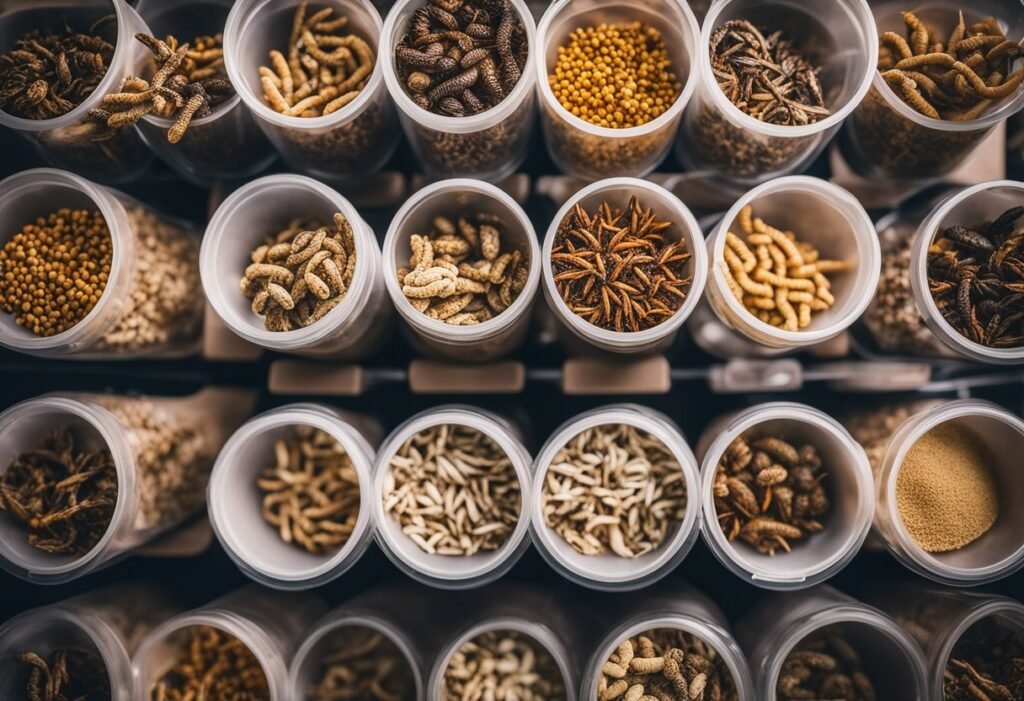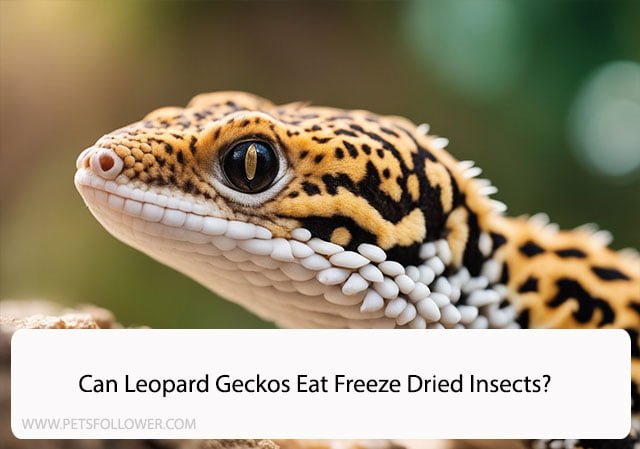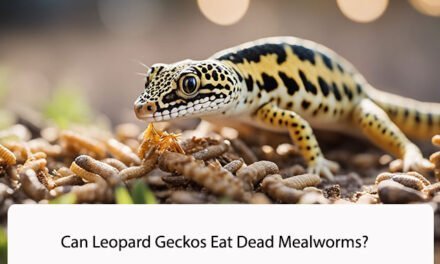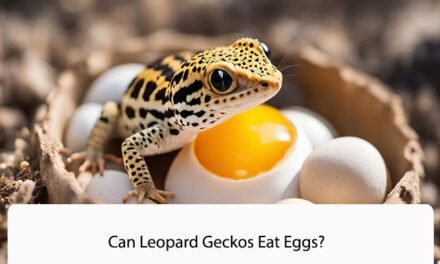Leopard geckos are a popular pet reptile that are relatively easy to care for. One of the most important aspects of their care is their diet. Leopard geckos are insectivores, meaning that they primarily eat insects. However, many owners wonder if it is safe to feed their leopard geckos freeze-dried insects.
Freeze-dried insects are a popular option for many reptile owners because they are convenient and have a long shelf life. They also don’t require the care and maintenance that live insects do. However, when it comes to feeding leopard geckos, there are some important things to consider. While freeze-dried insects can be a good source of nutrition, they should not be the sole diet of a leopard gecko. Insects that are alive and moving are more stimulating for leopard geckos, and they also provide important hydration. Additionally, freeze-dried insects can be less nutritious than live insects, so it’s important to choose high-quality brands.
Nutritional Benefits of Freeze-Dried Insects for Leopard Geckos

Freeze-dried insects are a popular choice for leopard gecko owners as they are convenient and have a long shelf life. But are they nutritionally beneficial for our gecko friends?
The answer is yes! Freeze-dried insects are a great source of protein, which is essential for leopard geckos to maintain their health and energy levels. Protein is also important for growth and development, making it especially important for juvenile geckos.
In addition to protein, freeze-dried insects also contain essential vitamins and minerals. For example, crickets are a good source of calcium and phosphorus, which are important for strong bones and teeth. Mealworms are high in fat, which is important for providing energy, and they also contain vitamin B12, which is important for nerve function.
It is important to note that freeze-dried insects should not be the sole source of nutrition for leopard geckos. They should be supplemented with fresh insects and a variety of fruits and vegetables to ensure a balanced diet.
Overall, freeze-dried insects can be a convenient and nutritious addition to a leopard gecko’s diet. Just be sure to use them in moderation and supplement with other foods to ensure your gecko is getting all the nutrients they need.
Types of Freeze-Dried Insects Suitable for Leopard Geckos

When it comes to feeding leopard geckos, it’s important to provide them with a variety of food options to ensure they receive all the necessary nutrients. Freeze-dried insects are a convenient and easy way to provide a diverse diet for your leopard gecko. Here are some types of freeze-dried insects that are suitable for leopard geckos:
Mealworms
Mealworms are a popular choice for leopard geckos and are readily available in freeze-dried form. They are high in protein and easy to digest, making them a great staple food for your gecko. However, it’s important to note that mealworms should not be the only food in your leopard gecko’s diet, as they are low in calcium.
Crickets
Crickets are another common food for leopard geckos and are also available in freeze-dried form. They are a good source of protein and can help promote exercise and activity in your gecko. However, it’s important to ensure that the crickets are gut-loaded with nutritious food before feeding them to your gecko.
Dubia Roaches
Dubia roaches are a great alternative to crickets and mealworms, as they are higher in protein and calcium. They are also available in freeze-dried form, making them a convenient food option for your leopard gecko. However, it’s important to ensure that the dubia roaches are appropriately sized for your gecko and that they are not the only food in their diet.
Overall, freeze-dried insects can be a great addition to your leopard gecko’s diet, as long as they are used in conjunction with other nutritious foods. It’s important to provide a varied diet to ensure your gecko receives all the necessary nutrients for optimal health.
How to Properly Feed Freeze-Dried Insects to Leopard Geckos
Leopard geckos are insectivores and require a diet rich in protein. One of the easiest ways to provide them with a variety of insects is by feeding them freeze-dried insects. However, there are a few things to keep in mind when feeding freeze-dried insects to leopard geckos.
Hydration Considerations
Freeze-dried insects lack the moisture content of live insects, which can lead to dehydration in leopard geckos. It is important to ensure that your leopard gecko has access to fresh water at all times. You can also mist the enclosure to increase humidity levels.
Supplement Coating
Freeze-dried insects may lack some of the essential nutrients that live insects provide. To ensure that your leopard gecko is getting all the necessary nutrients, you can coat the freeze-dried insects with a supplement powder. This powder should be specifically formulated for leopard geckos and should be dusted on the insects before feeding.
It is important to note that freeze-dried insects should not be the sole source of food for leopard geckos. It is recommended to offer a variety of live insects as well to ensure a balanced diet.
In conclusion, freeze-dried insects can be a convenient way to provide leopard geckos with a variety of insects. However, it is important to keep in mind the hydration considerations and supplement coating to ensure that your leopard gecko is getting all the necessary nutrients.
Frequency and Quantity of Freeze-Dried Insects in Diet
When it comes to feeding leopard geckos, freeze-dried insects can be a convenient and nutritious option. However, it’s important to consider the frequency and quantity of freeze-dried insects in their diet.
We recommend offering freeze-dried insects as a supplement to a varied diet of live insects. Freeze-dried insects lack the moisture content of live insects, which can lead to dehydration if they are the sole source of food.
As a general rule, freeze-dried insects should make up no more than 10% of a leopard gecko’s diet. This means that if you feed your gecko 10 insects per feeding, no more than 1 of those should be freeze-dried.
It’s also important to note that not all freeze-dried insects are created equal. Some brands may have added preservatives or lack certain nutrients that live insects provide. Be sure to read the ingredient list and nutritional information before purchasing freeze-dried insects for your gecko.
In summary, freeze-dried insects can be a convenient and nutritious addition to a leopard gecko’s diet, but should not be relied upon as the sole source of food. Offer them as a supplement in moderation and choose a high-quality brand to ensure your gecko is getting the nutrients they need.
Potential Risks and Drawbacks of Freeze-Dried Insects
When it comes to feeding leopard geckos, freeze-dried insects may seem like a convenient option. However, there are potential risks and drawbacks to consider.
Lack of Moisture
One major concern with freeze-dried insects is their lack of moisture. Leopard geckos require a certain level of hydration to maintain their health, and feeding them dehydrated insects can lead to dehydration.
To combat this issue, it is important to make sure that your leopard gecko has access to fresh water at all times. Additionally, you may want to consider offering live insects as well, which contain more moisture than their freeze-dried counterparts.
Reduced Nutritional Value
Another drawback of freeze-dried insects is their reduced nutritional value. While fresh insects provide a variety of vitamins and minerals, the process of freeze-drying can cause some of these nutrients to break down or be lost altogether.
If you choose to feed your leopard gecko freeze-dried insects, it is important to supplement their diet with other sources of nutrition. This may include fresh fruits and vegetables, as well as vitamin and mineral supplements.
Overall, while freeze-dried insects may be a convenient option for feeding leopard geckos, it is important to consider the potential risks and drawbacks. By taking steps to ensure your gecko stays hydrated and receives adequate nutrition, you can help keep them healthy and happy.
Alternatives to Freeze-Dried Insects
As leopard geckos are insectivores, their diet primarily consists of insects. While freeze-dried insects are a convenient option, there are other alternatives that can provide better nutrition for your pet.
Live Insects
Live insects are a great option for leopard geckos as they provide a more natural and nutritious diet. They are also more stimulating for your pet as they can hunt and chase their prey, which can help with their mental and physical health.
Some of the best live insects for leopard geckos include crickets, mealworms, and dubia roaches. It is important to ensure that the insects are the appropriate size for your gecko and that they are gut-loaded (fed a nutritious diet) before being fed to your pet.
Gut-Loaded Prey
Gut-loading is the process of feeding insects a nutritious diet before feeding them to your leopard gecko. This can significantly increase the nutritional value of the insects and provide a more balanced diet for your pet.
Some good options for gut-loading insects include fresh fruits and vegetables, commercial gut-loading diets, and calcium supplements. It is important to ensure that the insects are not overfed as this can lead to obesity and other health problems for your pet.
In conclusion, while freeze-dried insects are a convenient option, live insects and gut-loaded prey can provide a more nutritious and stimulating diet for your leopard gecko. It is important to ensure that the insects are the appropriate size and gut-loaded before feeding them to your pet to ensure their optimal health and wellbeing.
Frequently Asked Questions
Are freeze-dried mealworms safe for leopard geckos to consume?
Yes, freeze-dried mealworms are safe for leopard geckos to consume. However, it’s important to note that freeze-dried insects should not be the sole source of nutrition for your leopard gecko. They should be offered as a supplement to a varied diet of live insects.
What alternative foods can I offer to my leopard gecko in the absence of live insects?
In the absence of live insects, you can offer your leopard gecko commercially available canned insects or commercially prepared diets. However, it’s important to note that these should not be the sole source of nutrition for your leopard gecko. They should be offered as a supplement to a varied diet of live insects.
Is there any nutritional difference for leopard geckos between eating live and freeze-dried insects?
Yes, there is a slight nutritional difference between live and freeze-dried insects. Live insects are generally more nutritious than freeze-dried insects. However, freeze-dried insects can be a convenient and safe option for supplementing your leopard gecko’s diet.
Which insects should be avoided in a leopard gecko’s diet?
Leopard geckos should not be fed insects that are too large or too hard to digest, such as superworms or mealworms that are too large. They should also not be fed insects that are toxic, such as fireflies or wild-caught insects that may have been exposed to pesticides.
How do I properly prepare freeze-dried insects for a leopard gecko?
To properly prepare freeze-dried insects for a leopard gecko, you should rehydrate them by soaking them in warm water for a few minutes before feeding them to your gecko. This will help make them easier to digest and more palatable.
Can providing a diet of freeze-dried crickets meet the nutritional needs of leopard geckos?
No, providing a diet of only freeze-dried crickets cannot meet the nutritional needs of leopard geckos. Freeze-dried insects should be offered as a supplement to a varied diet of live insects to ensure that your leopard gecko receives all the necessary nutrients.





